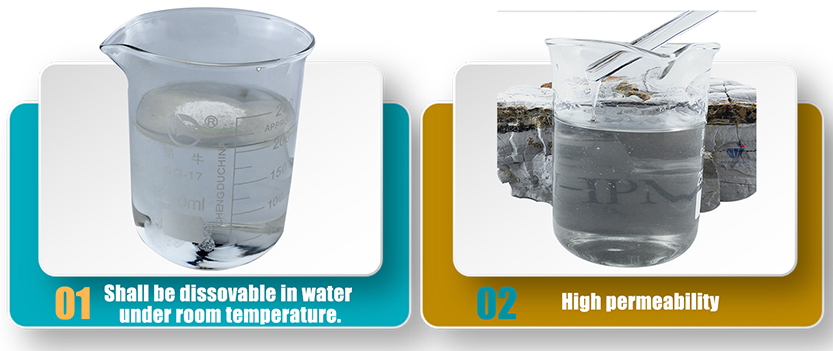
Oct . 14, 2024 13:26 Back to list
hpmc properties
Understanding HPMC Properties and Their Applications
Hydroxypropyl Methylcellulose (HPMC) is a versatile cellulose ether that has garnered significant attention in various industries due to its unique properties. This non-ionic polymer is derived from natural cellulose, making it an eco-friendly alternative for many applications, ranging from pharmaceuticals to food processing and construction.
Chemical Composition and Structure
HPMC is created by modifying cellulose, a natural polymer found in the cell walls of plants. The modification process involves the introduction of hydroxypropyl and methyl groups into the cellulose chain. This alteration enhances the solubility of cellulose in organic solvents and water, allowing for a broader range of applications. The degree of substitution, which refers to the number of hydroxyl groups replaced by hydroxypropyl and methyl groups, plays a crucial role in determining the properties of HPMC, including viscosity, gel formation, and thermal stability.
Key Properties of HPMC
1. Solubility One of the most remarkable properties of HPMC is its solubility in water. Depending on its chemical composition, HPMC can dissolve in cold or hot water, forming a clear, viscous solution. This property is beneficial in various applications, especially in the food and pharmaceutical industries.
2. Viscosity HPMC solutions exhibit pseudoplastic behavior, meaning that their viscosity decreases under shear stress. This characteristic is particularly advantageous for processes requiring easy handling and application, such as in coatings and adhesives.
3. Film-Forming Ability HPMC can form films that are flexible and resilient. This property is utilized in the creation of controlled-release drug formulations, where a protective film encases the active pharmaceutical ingredient, thereby regulating its release rate.
4. Thermal Stability HPMC exhibits excellent thermal stability, making it suitable for high-temperature applications. It does not dissolve or degrade easily when exposed to heat, which is essential in many manufacturing processes.
hpmc properties

5. Biodegradability As a cellulose derivative, HPMC is biodegradable, making it an environmentally friendly option compared to synthetic polymers. This feature is increasingly important in a world striving for sustainability.
Applications of HPMC
1. Pharmaceuticals HPMC is widely used in pharmaceuticals for its binding, film-forming, and thickening properties. It serves as a crucial ingredient in tablet formulations, coatings, and controlled-release systems. Its ability to form stable suspensions also makes it ideal for encapsulating drugs.
2. Food Industry In the food sector, HPMC is used as a thickener, emulsifier, and stabilizer. It enhances the texture and shelf life of various products, including sauces, dressings, and baked goods. The use of HPMC in gluten-free products has also gained popularity, as it provides elasticity and improves the mouthfeel of gluten-free dough.
3. Construction HPMC is used as an additive in cement-based formulations and dry-mix mortars. Its water retention properties help improve the workability and adhesion of mortars while ensuring that the mixtures remain moist for a more extended period during setting.
4. Personal Care Products In cosmetics and personal care products, HPMC is employed as a thickening and emulsifying agent. It helps improve the texture of lotions, creams, shampoos, and gels, providing a desirable consistency and enhancing the overall product experience.
5. Agriculture HPMC is also finding applications in the agricultural sector as a soil conditioner and a carrier for pesticides and fertilizers. It aids in moisture retention and promotes better nutrient absorption for plants.
Conclusion
HPMC is a remarkable polymer with diverse properties that open up a wide range of applications across multiple industries. Its environmentally friendly nature, combined with its unique functional properties, makes it a valuable ingredient in formulations for pharmaceuticals, food, construction, personal care, and agriculture. As research and technology continue to evolve, it is likely that the utilization of HPMC will expand further, paving the way for innovative solutions that prioritize sustainability and efficacy. Understanding the properties and applications of HPMC can help industries optimize their use, ensuring that they benefit from this versatile material to meet modern demands.
-
Versatile Hpmc Uses in Different Industries
NewsJun.19,2025
-
Redispersible Powder's Role in Enhancing Durability of Construction Products
NewsJun.19,2025
-
Hydroxyethyl Cellulose Applications Driving Green Industrial Processes
NewsJun.19,2025
-
Exploring Different Redispersible Polymer Powder
NewsJun.19,2025
-
Choosing the Right Mortar Bonding Agent
NewsJun.19,2025
-
Applications and Significance of China Hpmc in Modern Industries
NewsJun.19,2025







